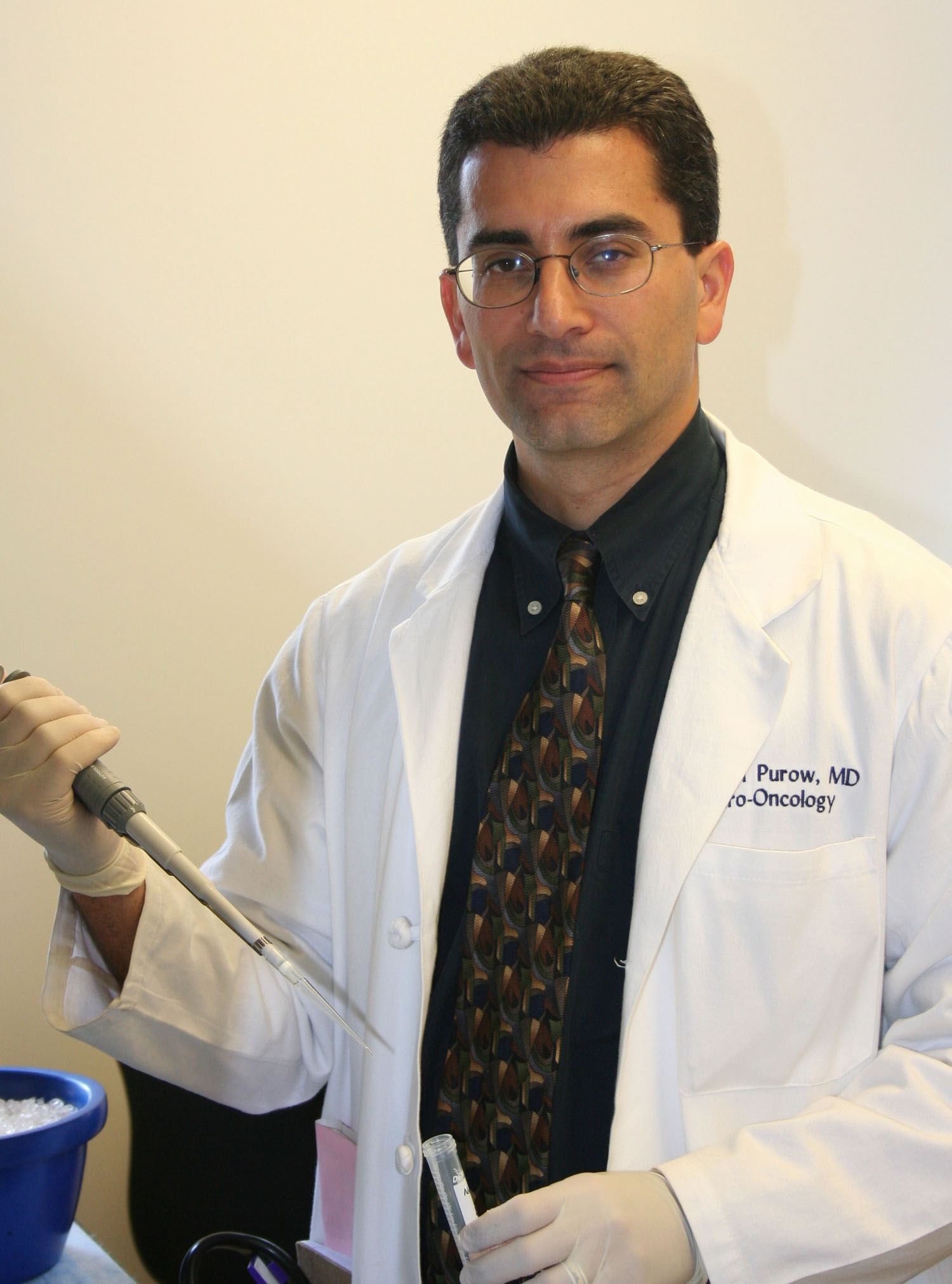June 11, 2008 — One of the biggest challenges for new tenure-track faculty at medical schools is securing initial funding for their research. For University of Virginia neuro-oncologist Dr. Benjamin W. Purow, that challenge has been met.
Purow has been awarded a five-year, $375,000 Early Career Physician-Scientist Award from the Howard Hughes Medical Institute for his work in studying glioma, the most common and lethal brain tumor.
"I am very grateful to HHMI for this support of my research," says Purow. "This definitely takes some of the pressure off for securing additional funding."
Purow is a physician in the Neuro-Oncology Center at U.Va. Medical Center. His grant will allow him to focus his research on a molecule, microRNA-7, that has therapeutic potential for gliomas. He explains that microRNA-7 molecules are found in some normal cells, but are suppressed in glioma cells. In the lab, Purow has shown that re-introducing microRNA-7 to glioma cells slows cell division, causes cell death and retards invasion of glioma cells.
"The selection of Dr. Purow for a Howard Hughes Early Career Physician-Scientist Award reflects his status as one of the nation's most promising 'translational' researchers in oncology," says David Schiff, M.D., co-director of the U.Va. Neuro-Oncology Center. "He is one of the few physicians making contributions in both the laboratory and clinic for brain tumors. His pioneering work on microRNA holds the promise of transforming the management of malignant brain tumors."
This is the third year the Howard Hughes Medical Institute has funded the Early Career Physician-Scientist Award. The award is given to physicians who have just begun their research careers, and have less than two years in a tenure-track position.
The $75,000-per-year award must be used for direct research expenses and does not support the awardee's salary. The physician-scientists often use the funds to hire a technician or purchase vital research equipment.
"We think the most valuable thing we can give them is time," said Peter J. Bruns, the Hughes Institute's vice president for grants and special programs. The institute requires that awardees spend at least 70 percent of their time doing research.
"Many physician-scientists drop out of research during their first few years in the field, discouraged by failed grant applications or the lack of time to focus on their research," Bruns explained.
Dr. Karen Johnston, chairwoman of U.Va.'s Department of Neurology, said Purow is rapidly developing a reputation as one of the most promising young neuro-oncology researchers in the field.
"This prestigious award will allow him to accelerate his work in the laboratory, which will facilitate getting better treatments to our brain cancer patients sooner. I could not be more pleased about Dr. Purow's award or the important work he is doing to cure brain tumors," Johnston said.
Purow hopes that when the grant has been completed in five years, his lab will have produced some preclinical data with promising results in mouse models of glioma. This would serve as the launching point for going into clinical trials with patients.
Purow has been awarded a five-year, $375,000 Early Career Physician-Scientist Award from the Howard Hughes Medical Institute for his work in studying glioma, the most common and lethal brain tumor.
"I am very grateful to HHMI for this support of my research," says Purow. "This definitely takes some of the pressure off for securing additional funding."
Purow is a physician in the Neuro-Oncology Center at U.Va. Medical Center. His grant will allow him to focus his research on a molecule, microRNA-7, that has therapeutic potential for gliomas. He explains that microRNA-7 molecules are found in some normal cells, but are suppressed in glioma cells. In the lab, Purow has shown that re-introducing microRNA-7 to glioma cells slows cell division, causes cell death and retards invasion of glioma cells.
"The selection of Dr. Purow for a Howard Hughes Early Career Physician-Scientist Award reflects his status as one of the nation's most promising 'translational' researchers in oncology," says David Schiff, M.D., co-director of the U.Va. Neuro-Oncology Center. "He is one of the few physicians making contributions in both the laboratory and clinic for brain tumors. His pioneering work on microRNA holds the promise of transforming the management of malignant brain tumors."
This is the third year the Howard Hughes Medical Institute has funded the Early Career Physician-Scientist Award. The award is given to physicians who have just begun their research careers, and have less than two years in a tenure-track position.
The $75,000-per-year award must be used for direct research expenses and does not support the awardee's salary. The physician-scientists often use the funds to hire a technician or purchase vital research equipment.
"We think the most valuable thing we can give them is time," said Peter J. Bruns, the Hughes Institute's vice president for grants and special programs. The institute requires that awardees spend at least 70 percent of their time doing research.
"Many physician-scientists drop out of research during their first few years in the field, discouraged by failed grant applications or the lack of time to focus on their research," Bruns explained.
Dr. Karen Johnston, chairwoman of U.Va.'s Department of Neurology, said Purow is rapidly developing a reputation as one of the most promising young neuro-oncology researchers in the field.
"This prestigious award will allow him to accelerate his work in the laboratory, which will facilitate getting better treatments to our brain cancer patients sooner. I could not be more pleased about Dr. Purow's award or the important work he is doing to cure brain tumors," Johnston said.
Purow hopes that when the grant has been completed in five years, his lab will have produced some preclinical data with promising results in mouse models of glioma. This would serve as the launching point for going into clinical trials with patients.
Media Contact
Article Information
June 11, 2008
/content/university-virginia-doctor-receives-early-career-physician-scientist-award

